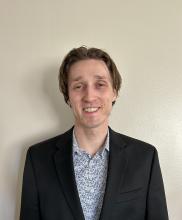Summer Bridge Spotlight: Samuel Froiland
Meet Samuel Froiland, one of five participants selected for the 2023 Summer Bridge program. A PhD student in the Department of History, Samuel worked with The Land Connection.

How have you applied your humanistic training to advance the mission of the community organization?
My humanities training has been a core part of my experience with The Land Connection. It has provided me with the content knowledge and methodological know-how to facilitate my project, which centers on sharing the knowledge and perspectives of experienced Illinois farmers with the community. In a series of blog posts written for The Land Connection, based upon interviews I did with local farmers, one can read for themselves about what farmers think about issues such as climate change, commodity crop farming, land prices, and the ability to secure adequate labor.
One of the core missions of The Land Connection is educating the public about where their food comes from and why it matters. As an environmental historian, I look at our food system and its relationship to the environment as the product of a political economy. The environment and our food system are contested spaces where successive decisions over many generations have made them what they are. In my blog posts, readers get a sense that their food system comes from this political economy; each farmer I interviewed was keen to express the role that systemic forces play in the shaping of our food system and that our ability to change it rests upon our collective decision making and the ability to find political will.
How has this experience contributed to your career development? What skills have you gained or developed?
Before working with The Land Connection, I acquired plenty of experience writing in my years of academic study. However, this summer, I have learned about the forms of writing needed for social media and outward facing communications for non-profits. The writing must consider a general audience and how to craft one’s writing to maximize the ability to be indexed by search engines. Whether I end up staying on an academic trajectory or venture out of the academy for employment, this experience has given me a greater understanding of how one needs to communicate in a 21st century digital economy.
In the context of the development of myself as a historian, the interviews I did with farmers have given me an introduction into oral history. While much of what I focus on now takes place in a time where oral history cannot be used as a viable source of information, this experience has taught me that oral history can be a deeply rewarding experience. It is something that I will not ever shy away from, should the opportunity present itself. Indeed, the interviews I did with farmers this summer have been some of the greatest experiences I have had in my entire time at UIUC.
What have you learned from working with this community organization?
The Land Connection has taught me is the value of forming healthy and quality relationships with people that you work with. The people at The Land Connection genuinely enjoy each other and their relationships form the backbone of a welcoming and productive work environment. The good relationships they have with each other extend to the farmers and network of food producers they regularly interact with. It has helped me see that among the most important things I am looking for in a work environment is the ability to get along well with the people I share that space with.
Working with The Land Connection, it would have been hard not to learn more about how our food system works and what it takes to make a sustainable food system. Both the farmers I interviewed and the staff at The Land Connection have taught me the necessity of pragmatism and the dangers of painting everything in black and white. For example, sheep farmer Cathe Capel educated me on why a truly organic wool is not practical, but a sustainable wool product is. I have learned that fetishizing things like “organic” helps to alienate us from finding meaningful solutions to issues like food security and climate change by blinding us to the tangible possibilities we have in front of us.
Is there anything else you’d like to share about your Summer Bridge program experience?
The Summer Bridge Program has been a wonderful experience. While at times it has been challenging when I have ventured into unfamiliar territory, succeeding despite the challenges has given me a great satisfaction and sense of accomplishment and community.